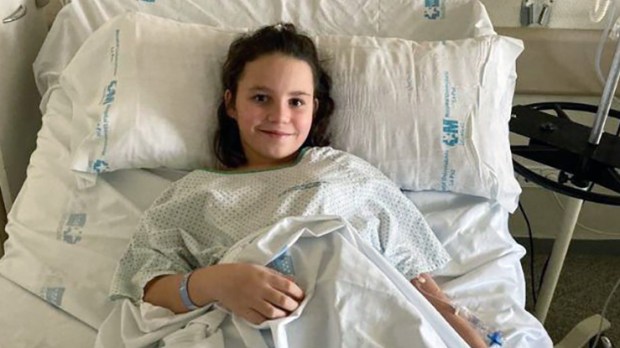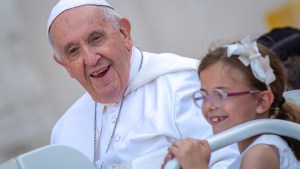The life of Teresita Castillo, the 10-year-old missionary girl who died in Spain on March 7, 2021, from a brain tumor, is a story worth telling our children because it can touch their hearts.
Here are 6 lessons they (and we) can learn from her:
1. How to remain joyful even when you’re ill
It’s good to teach children to face the difficulties of life – from a setback that saddens them to an illness in the family, even their own. Looking at the life of this exemplary girl can help us talk with our kids about how difficulties can be offered up.
Teresa was diagnosed with a brain tumor in 2015. She was 5 years old. The consequent operation and chemotherapy were a success at first, but in 2018 the tumor showed its face once more. Again it was necessary to operate. In 2020, a blow to the head while playing took her back to the hospital, and in January of 2021 year she was hospitalized with severe pain. She remained in the hospital until her death in March of that year.
Despite the difficulties, Teresa Castillo never lost her smile, her concern for others, or her faith. She found in suffering a way to get closer to God. Teresita said, “I’m offering it up for people; for example, for someone who is ill, and for priests.” Her mother explained that the little girl felt that Jesus was making use of her sufferings to save more souls.
2. The importance of missionaries
It’s not common for young children to stop and think about missionaries. But we can talk to them about missionary work, and above all, about its meaning: to make Jesus known in all parts of the world. People can be missionaries in the remotest places on the planet, or in the classroom where they go to school. Again, Teresita can give us material to address this issue with children.
It surprised everyone that, despite her youth, Teresita had a very clear idea of her vocation. She wanted to be a missionary. She wanted to take Jesus to every corner of the world. Her decision was firm, even in the worst moments of her illness.
The episcopal vicar of that region of Madrid went to the hospital where Teresita was being treated. He found her in bed, weak, with her head bandaged. In spite of this, the girl told him what her family already knew: “I want to be a missionary. I want to live for Jesus.”
The vicar was very impressed, and deeply moved, he answered her: “Teresita, I constitute you this very instant as a missionary of the Church and I will return this afternoon to bring you your official document and the missionary cross.” And so it happened. She asked her mother: “Put the cross on the bar of the hospital bed, so I can get a good look at it. Tomorrow I’m taking it to the operating room. I’m already a missionary!”
3. Sensitivity to the suffering of others
Teresita Castillo was an only child, born to Russian parents in Siberia. She was adopted by a Spanish couple when she was 3 years old. Once they had finished the paperwork, Teresa and Eduardo, her new parents, went to pick her up and bring her back to Spain to begin her new life.
On the way, during a stop in Moscow, the 3-year-old girl saw a woman begging and started talking to her. Her parents don’t know what they said to each other, but the woman bought the little girl a chocolate Easter egg with some of the few coins she had received. The parents didn’t understand anything they said because they spoke in Russian, but they were surprised.
Once in Spain, they came to understand that Teresita had a special sensitivity to people’s suffering and loneliness. Only a few months later, in Madrid, she saw a beggar with no legs. Without a word she went to him and gave him a hug and a kiss. Scenes like this were often repeated.
Wherever she saw sadness, she brought her joy. Perhaps we can ask our children how they react when they see these people, if they can give alms or say a prayer for them.
4. Pray with joy
Teresita prayed every day. When she was at home with her mother because of her illness, she went to Mass with her every day. She tried to do the same at her school.
At home, her mother invited her to pray a decade of the Rosary with her, but the girl didn’t think it was enough, and so they prayed the whole Rosary together. And they prayed it every night as well. We should also pray with our children, and encourage them to pray with joy, not as a mere rote repetition; we should teach them to put their heart, affection, and enthusiasm into it.
5. Love the Eucharist
Teresita Castillo went to Mass whenever she could. There she met the Lord under the species of bread and wine. Her First Communion was an incredibly special day for her: “I felt that God loved me and loved me, and that He was inviting me to Heaven,” she would answer when asked about that day.
During her illness, when she was confined to bed with hardly any strength, Communion was brought to her in her room or in the ICU. The vicar who made her a missionary tells us that when he went to visit her in the hospital, the first thing she said to him was a question: “You’re bringing me Jesus, right? … Do you know what? I love Jesus very much.”
It can be a good exercise to remind our children of their own First Communion, or to use the example of Teresita to prepare those who haven’t received it yet. In both cases, we can help them to prepare their hearts better for the Eucharist.
6. Getting to know the saints
Her life has gone viral. Her story is a testimony worth telling because it has the odor of holiness. She herself was familiar with the child saints. At the funeral after Teresita’s death, the father recounted a moment shortly before the last operation, when he wanted to encourage his daughter, telling her she was going to live. Teresita replied: “No, daddy, I’m going to heaven. I saw Carlo Acutis in a dream and I’m going to heaven.” Carlo had recently been beatified in Assisi. He’s a contemporary saint who can inspire the children of our time.
Teresita Castillo’s parents taught her the lives of the saints. In fact, her missionary vocation was awakened after watching a cartoon film of Teresa of Calcutta. Knowing about the saints is the first step in having a relationship with them, in asking for their intercession and learning from their example.



